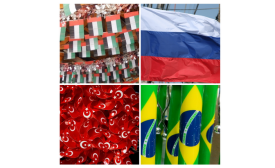russia
Four cities are currently in the running to host the 2020 World Expo: Dubai, UAE; Ekaterinburg, Russia; Izmir, Turkey; and Sao Paulo, Brazil. On November 27, the Bureau International des Expositions will have a meeting of its general assembly to determine the winner. Each city came up with their own proposed theme and objectives for the Expo; read on to find out more.

**UPDATE: On November 27, the BIE announced that the United Arab Emirates has been elected as the host country of the World Expo 2020**
Twenty years after the collapse of the Soviet Union, Ukraine is slipping back under Kremlin control. Ukraine’s shock decision to opt for Vladimir Putin’s Russia and pull out of EU talks on the eve of an historic deal is a dramatic upset to the European balance of power. It is the first major defeat for the EU in its eastward march since the fall of Communism. While the region’s geo-politics remain fluid, the upset may prove as fateful as the move by the Kossack chief Bohdan Khmelnytsky to turn his back on the West and accept Tsarist suzerainty in the 1640s.
On Wednesday, the Spanish government announced a draft proposal to introduce anti-protest measures that would make Russia’s handling of activists look magnanimous in comparison. If passed, the bill will penalize many accepted forms of peaceful protest with fines and prison sentences, which isn't a great look for a country with a fascist past.
In a dramatic easing of its hardline stance, Russian courts granted bail this week to nineteen of the thirty Greenpeace crew members detained since September for a protest outside a Russian oil rig in the Arctic. Seven activists received the good news today, joining others who appeared in court on Monday and Tuesday, while another twelve are still awaiting custody hearings. So far, only one detainee has been set free.
Ukraine has rejected draft laws that would allow the release of a jailed opposition leader, suspended plans for a landmark agreement with the European Union and announced it will renew active dialogue with Russia. The Ukrainian parliament's failure to pass the bills on Thursday to grant freedom to the former prime minister Yulia Tymoshenko, took away the country's last chance to satisfy the EU's condition for stepping towards integration with the 28-member bloc.
Often, the enjoyment of a work of art requires one to forget about its message and simply focus on its sensory appeal. In other cases, the work of art is the message. The project of cultural diplomacy often straddles this border between agenda and art for art's sake, and at a time when U.S.-Russian relations are publicly frayed, cultural exchange can help to keep tensions at bay. Last week, Grammy Award-winning American saxophonist Bill Evans, a former bandmate of Miles Davis, performed with his band "Soulgrass" at Spaso House, the official residence of the U.S. ambassador.
For all the crude xenophobic placards and slogans at this week's Russian March, one stood out for its—dare I say—cleverness. “The good half of the population already hates the regime. Soon you will get to know the bad half,” read a sign carried by a marcher. Not only was it clever, but it also rang true. In a recent editorial, Gazeta.ru wrote that “for the first time, nationalist marches are taking on an oppositionist character.”







